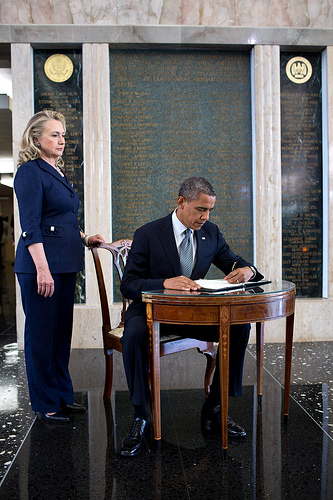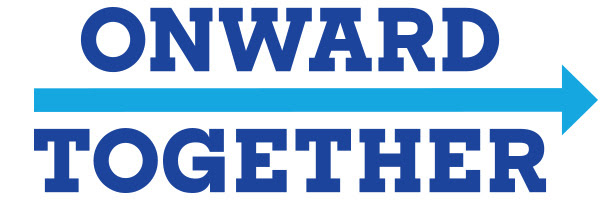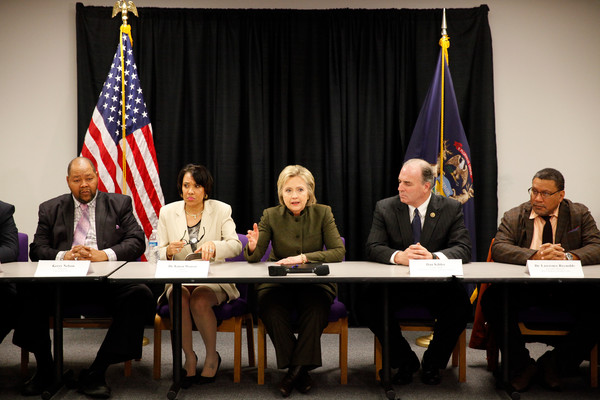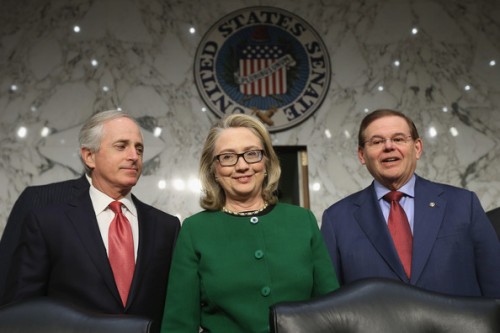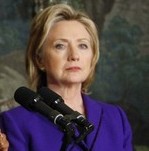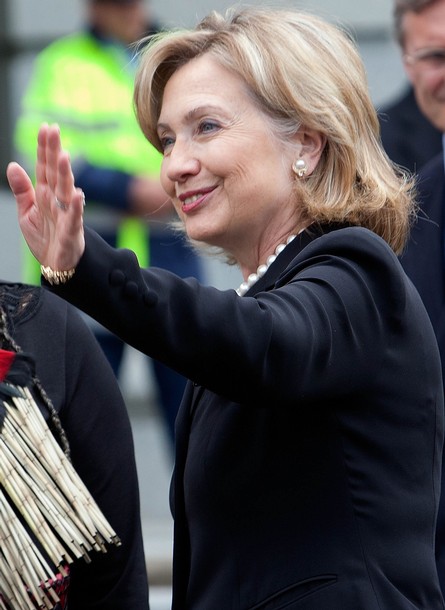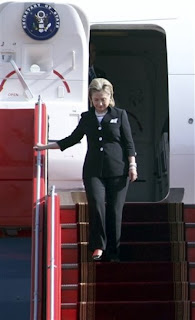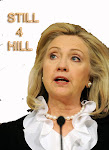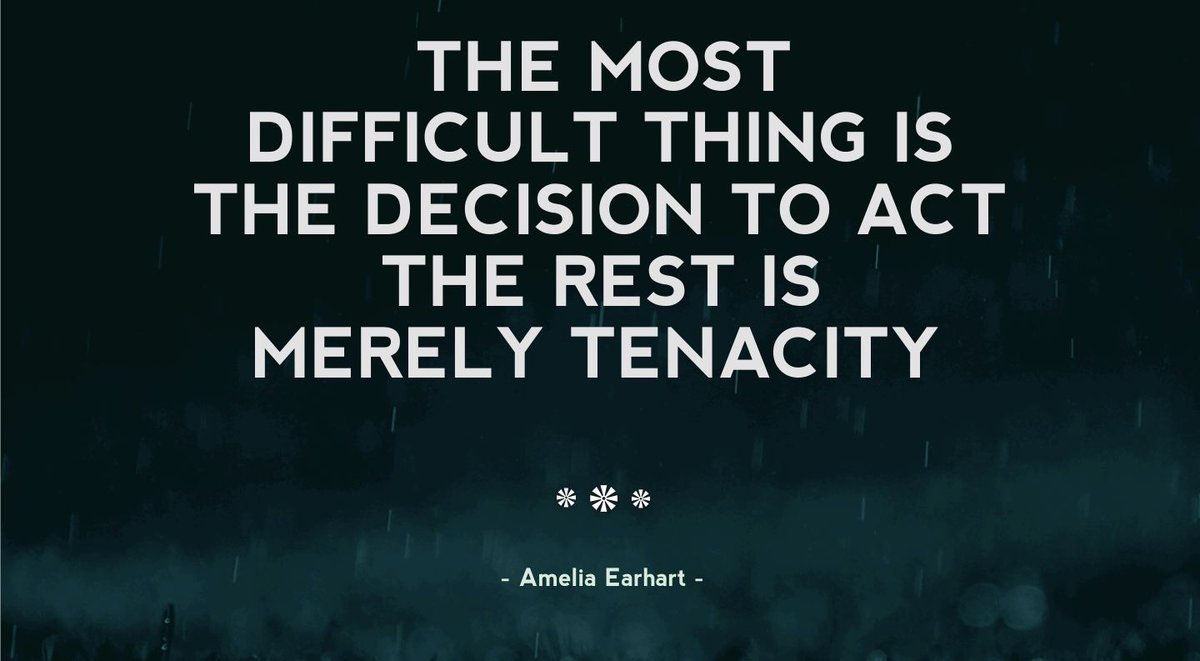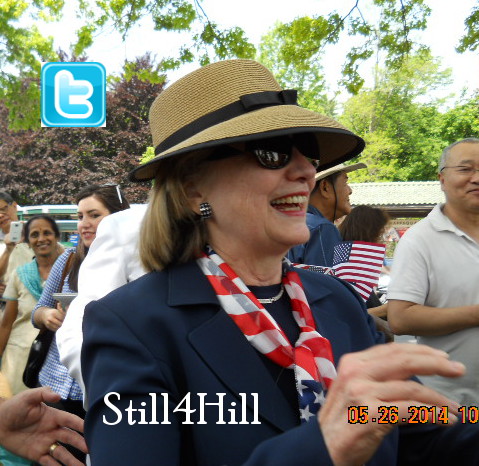“They’re sitting on a powder keg.” Hillary begins this chapter in January 2011 as she prepped to speak at Forum for the Future, an annual meeting where the rich and powerful of the Arab world convene. In Morocco in November 2009, early in her tenure at the State Department, but already having set signature issues and standards of engagement, she gently and subtly prodded these leaders toward inclusion of marginalized citizens, particularly women and young people. I have always thought of that speech as foreshadowing the events that were to come. I have also always thought that she was clear-eyed due to her outreach to civil society.
Hillary Clinton knew the people and their concerns better than their own leaders had bothered to know them. When she delivered that Morocco speech, she should have been seen the way an outside consultant is in a corporation. Had she been, her findings and advice might have been heeded.

… it is results, not rhetoric, that matter in the end. Economic empowerment, education, healthcare, access to energy and to credit, these are the basics that all communities need to thrive. And the United States seeks to pursue these common aspirations through concrete actions. We know that true progress comes from within a society and cannot be imposed from the outside, and we know that change does not happen overnight. So we will not focus our energies on one-time projects, but we will seek to work with all of you in government and in civil society to try to build local capacity and empower local organizations and individuals to create sustainable change…
Earlier this year, I visited an Access classroom in Ramallah. I walked into an enthusiastic discussion of Women’s History Month. These were students who did not come from educated families, but they were students with the same ambition and motivation that we heard described by our colleague, the Palestinian foreign minister, about his own son. We want to create more opportunities for students like these to fulfill their God-given potential.
And this points to a related priority – the empowerment of women. I have said, as some of you know, for many years, and President Obama said it in Cairo, no country can achieve true progress or fulfill its own potential when half of its people are left behind. When little girls are not given the same opportunities for education, we have no idea what we are losing out on because they’re not going to be able to contribute to the growth and the development of their countries…
Our work is based on empowering individuals rather than promoting ideologies; listening and embracing others’ ideas rather than simply imposing our own; and pursuing partnerships that are sustainable and broad-based…
As leaders of countries that have a direct stake and care deeply about all of the final status issues that must be resolved, I would just ask you to think about how we can each demonstrate the commitment that is necessary for us to go forward.
Having adhered to the status quo, these leaders and elder statemen were about to experience what Hillary had seen coming all along: upheaval.
On the cusp of wide-spread revolution with Tunisia already boiling over, Hillary did not want to make a boilerplate speech. She wanted to be clear, strong, and firm. If they did not change the way they governed, change would find them. She recalls that her predecessor, Condoleeza Rice, had paved the way in 2005 when she stated that for more than half a century the U.S. had chosen to pursue “stability at the expense of democracy” and had “achieved neither” Hillary intended to make the case for democracy crystal clear in Doha: resisting change is nothing more than a recipe for unrest and conflict – a petri dish for terrorism.
Secretary Clinton’s Travel to the United Arab Emirates, Oman, and Qatar
January 6, 2011 by still4hill
Background Briefing on the Secretary Clinton’s Upcoming Travel
January 7, 2011 by still4hill
As she prepared to travel, the Lebanese government became shaky. She met with Prime Minister Hariri and King Abdullah of Saudi Arabia in New York prior to departure.
Secretary Clinton and Escort Meet Saudi King Abdullah and Lebanese PM Hariri
January 8, 2011 by still4hill


The next day she was wheels up for Abu Dhabi. Protests had spread all over Tunisia fueled, abetted, and broadcast by social media, the 21st century bête noire of despots. Her first public remarks on the trip were to graduate students at a high-tech institute.
Secretary Clinton’s Remarks at The Masdar Institute (U.A.E.)
January 10, 2011 by still4hill

The old strategies for growth and prosperity will no longer work. For too many people in too many places, the status quo today is unsustainable. And the UAE is leading our work and the path we must take into the future. It is putting into practice what it means to be sustainable and laying the groundwork for economic, environmental, and social progress.
From there she proceeded to Yemen which she describes as representative of the warnings she had prepared to voice in Abu Dhabi.
Secretary Clinton’s Surprise Visit to Yemen
January 11, 2011 by still4hill
She met with the president and he took her on a tour of the Old City of Sanaa where she found the women veiled and the men armed with daggers and Kalashnikovs.
Secretary Clinton’s Remarks With Yemeni President Ali Abdullah Saleh After Their Meeting
January 11, 2011 by still4hill
Her next port-of-call was Oman, a monarchy, where she met with Sultan Qaboos. In the book she offers a review of progressive change since the 1970s so impressive that in 2010 the U.N. Development Programme ranked it the most improved country in human development over that period.
Slideshow of Secretary Clinton in Oman: Part I
January 12, 2011 by still4hill

Slideshow of Secretary Clinton in Oman: Part II
January 12, 2011 by still4hill
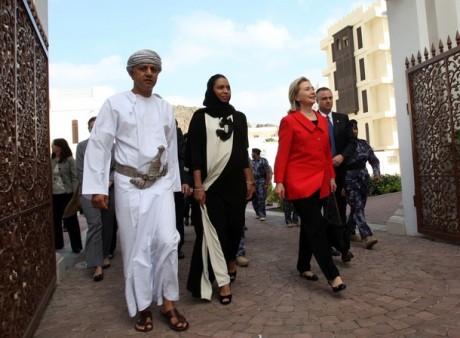
The Hariri government disintegrated on January 12 while the prime minister was in Washington D.C.
Finally, on the 13th, the speech so carefully prepared. This is a speech I have posted here several times. If you have never read it, it is well worth reading.

Video: Secretary Clinton’s Remarks at Forum for the Future
January 13, 2011 by still4hill
… in too many places, in too many ways, the region’s foundations are sinking into the sand. The new and dynamic Middle East that I have seen needs firmer ground if it is to take root and grow everywhere. And that goal brings us to this Forum … You can help build a future that your young people will believe in, stay for, and defend …Those who cling to the status quo may be able to hold back the full impact of their countries’ problems for a little while, but not forever … let us face honestly that future. Let us discuss openly what needs to be done. Let us use this time to move beyond rhetoric, to put away plans that are timid and gradual, and make a commitment to keep this region moving in the right direction.
The next day Tunisian strongman, Zine el Abidine Ben Ali, fled the country he had ruled with an iron fist for decades. Having played out on satellite TV and social media, the coup became an incentive in the region for other similarly oppressed populations.
Statement on Tunisia
January 14, 2011 by still4hill
On January 25, massive protests erupted in Tahrir Square in Cairo. Calling for “bread, freedom, and dignity,” the crowd grew daily and increasingly became focused on driving Hosni Mubarak from office. Hillary’s first comments on the Egyptian situation came in the context of a presser with Jordanian Foreign Minister Nasser Judeh.
Video: Secretary Clinton’s Remarks With Jordanian Foreign Minister Nasser Judeh
January 26, 2011 by still4hill
As we monitor this situation carefully, we call on all parties to exercise restraint and refrain from violence. We support the universal rights of the Egyptian people, including the rights to freedom of expression, association, and assembly. And we urge the Egyptian authorities not to prevent peaceful protests or block communications, including on social media sites.
Video: Secretary Clinton’s Statement on Egypt
January 28, 2011 by still4hill
Hillary reviews a 20-year history of acquaintance with Mubarak and his wife noting his steadfast support of the Camp David accords as well as the disappointment that human rights were never expanded.
Inside the White House there was disagreement over the appropriate posture to assume. Young and idealistic staffers were in the corner with the protesters. Joe Biden and Bob Gates had misgivings about appearing to push out a long-time partner and the signal that would send. Hillary saw the former point of view, but shared the latter concern. It was clear, however, that, important as his partnership for peace had been, Mubarak’s autocracy could not continue to be tolerated as events in Tahrir Square spiraled into violent confrontations.
(Hillary refers to this particular interview with David Gregory but does not mention that it was one of five Sunday morning interviews on this subject that morning nor that she then left for Haiti where she submitted to three more interviews that day. Our amazing girl!)
Secretary Clinton’s Interview With David Gregory of NBC’s Meet The Press
January 30, 2011 by still4hill
Long-term stability rests on responding to the legitimate needs of the Egyptian people, and that is what we want to see happen … peaceful, orderly transition to a democratic regime….
A major issue was the lack of coherence within the popular uprising. It was leaderless, driven by social media, and the only organized body in the country was the Muslim Brotherhood which, alone, appeared prepared to leap into the void if/when the Mubarak government fell, in which case, Hillary told President Obama, “it all may work out fine … in 25 years.”
Communications with Egyptian officials were over the phone. She told Foreign Minister Gheit that elections were going to be necessary. He told her that Mubarak remained defiant and refused to resign.
Hillary rcommended an envoy (Foreign Service verteran Farnk Wisner was chosen) and a package deal for Mubarak.
- End the emergency law of 1981 (still in effect);
- Pledge not to run (in a necessary election);
- Agree not to set up his son Gamal as successor.
The military issued a statement that it would not move on citizens while Mubarak made some concessions, but they were small, not major, and too little too late.
President Obama wanted change now.
Secretary Clinton’s Call to Egyptian Vice President Omar Soliman
February 2, 2011 by still4hill
Secretary of State Hillary Rodham Clinton called Egyptian Vice President Omar Soliman today to convey that today’s violence was a shocking development after many days of consistently peaceful demonstrations … also underscored the important role that the Egyptian Armed Forces have played in exercising restraint in the face of peaceful demonstrations and expressed concern that all parties recommit themselves to using only peaceful means of assembly.
Secretary Clinton’s Statement on Egypt
February 3, 2011 by still4hill
Hillary continued talking to FM Aboul Gheit by phone and your heart has to go out to him. (I always liked him.) He worried about an Islamist takeover and told Hillary that he wanted his little granddaughters “to grow up to be like their grandmother and like you … This is the fight of my life!”
Hillary proceeded to the Munich Conference.
Secretary Clinton’s Remarks at the Munich Security Conference Plenary Session
February 5, 2011 by still4hill |

How do we offer support to Egypt for its transition to a pluralistic democracy? How do we make sure that there is not greater instability?
… part of what we have to do is to send a consistent message supporting the orderly transition that has begun, urging that it be not only transparent and sincere, but very concrete, so that the Egyptian people and those of us on the outside can measure the progress that is being made.
… it is our hope that this proceeds peacefully, that it proceeds with specific goals being achieved, so that people can see that their voices have been heard, and that there be an election with international observers and with sufficient preparation and performance that it will be viewed as free, fair, and credible when it is finally held.
Video: Secretary Clinton on Events in the Middle East: “The Status Quo is Simply Not Sustainable”
February 5, 2011 by still4hill
Gheit, meanwhile, submitted to an interview on PBS voicing his government’s (i.e. Mubarak’s) attitude toward commentary from the U.S.
Odds & Ends from Today’s Press Briefing
February 9, 2011 by still4hill
QUESTION: On Egypt, before we get into the – have you seen the interview that Foreign Minister Aboul Gheit has done with PBS?
MR. CROWLEY: I have not. I’m aware of it. I think our friend and colleague, Margaret Warner, was there today.
QUESTION: Yeah. In that interview he’s pretty angry about what he regards as interference in U.S. – in the U.S. trying to – the Administration trying to dictate to the Egyptian leadership how and when they should do this transition. Do you – what do you make of those comments?
MR. CROWLEY: Well, I haven’t seen them, so I’m reluctant to comment specifically. I think from our standpoint, what’s important here is not how we view things. We’re not trying to dictate anything. As we’ve said and emphasized many times, there will be an Egyptian solution and Egyptian actions within this orderly transition. But it’s important that what Egypt does do is seen as credible in the eyes of the Egyptian people. And it’s our view that what they’ve put forward so far does not meet that threshold.
Hosni Mubarak stepped down on February 11 and did not leave the country. “I will die in Egypt,” he stated.
Where Hosni Mubarak Is
February 11, 2011 by still4hill
About a month later, Hillary visited Tahrir Square.
Secretary Clinton In Tahrir Square
March 16, 2011 by still4hill
To see where this revolution happened and all that it has meant to the world is extraordinary for me. It’s just a great reminder of the power of the human spirit and universal desire for human rights and democracy. It’s just thrilling to see where this happened.

She met with students and activists interested to hear their plans. They had none, were disorganized, argumentative, very inexperienced politically, and showed no interest in organizing a platform. She asked if they had considered forming a political coalition joining together on behalf of candidates and programs. She was met with blank stares and left fearing they would just turn the country over to the Muslim Brotherhood which, of course, is exactly what they did.
Video: Secretary Clinton’s Remarks Prior to Meeting With Egyptian Prime Minister
March 16, 2011 by still4hill

Field Marshall Tantawi permitted elections and when Morsi defeated his candidate he allowed the result to stand. As to the dueling conspiracy theories that the U.S. had helped/hindered the Muslim Brotherhood, she states that “logic never gets in the way of a good conspiracy theory.”
Hillary Clinton in Egypt: A Background Briefing
July 14, 2012 by still4hill

When she returned to Cairo in July 2012 she found the streets again filled with protesters – against her. Egyptian police did nothing to help her Diplomatic Security hold the crowds back. She could hear the anti-American chants 12 floors up in her hotel room.
Hillary Clinton with Egyptian FM Mohamed Kamel Amr
July 14, 2012 by still4hill

Despite the protests she insisted upon keeping to the itinerary and proceeding to the flag-raising event in Alexandria where, stateside, we heard that her car had been pelted with shoes and tomatoes. It was a little closer and more unsettling than what we were told. Her State Department spokesperson, Toria Nuland, was hit in the head with a tomato as they were leaving the event and being escorted very close to the angry crowd. When Hillary’s door closed, a man pounded a shoe against her window. No one was injured, thank heaven, but it was not for any assistance from Egyptian security.
Hillary Clinton at the Consulate Flag-Raising in Alexandria Egypt
July 15, 2012 by still4hill
On my visit to Egypt yesterday and today, I told people I wanted to listen more than talk. I wanted to hear firsthand the concerns, the issues, the aspirations that could be represented to me both by officials as well as citizens.
People want to know and are vigorously debating this among themselves, as you know so well, what this democratic transition occurring in Egypt will be like. Where will it lead?
I have come to Alexandria to reaffirm the strong support of the United States for the Egyptian people and for your democratic future. Yesterday in Cairo, I spoke about the immediate questions that you are facing.
The Egyptian people have every right in this new democracy to look to their leaders to protect the rights of all citizens, to govern in a fair and inclusive manner, and to respect the results of elections.
Earlier today, I met with members of Egypt’s Christian community, with a number of women leaders and advocates, and with young entrepreneurs who want to demonstrate that Egyptian young people are just as innovative and successful as young people anywhere. They have legitimate concerns….
Democracy is not just about reflecting the will of the majority; it is also about protecting the rights of the minority.
The Morsi government failed the inclusion test, was removed by the military a year after that visit, and Egypt continues to lack credible democratic institutions in Hillary’s assessment.
_____________________________________________________________
Jordan’s King Abdullah managed to stay ahead of the wave with credible legislative elections and a crackdown on corruption. One problem for Jordan after the fall of Mubarak was energy. Natural gas pipelines providing about 80% of Jordan’s energy needs were often attacked and the flow interrupted. Over a private lunch with the king at the State Department, Hillary suggested working out trade deals with Iraq and Israel. In 2013 an agreement with Iraq was signed and another with Israel in 2014. Crisis averted.
____________________________________________________________
Bahrain, Qatar, Kuwait, Saudi Arabia, the United Arab Emirates, all partners of ours, are members of the Gulf Cooperation Council initiated by Hillary as secretary of state. They formed a complex web.
Hillary found negotiating with them over human rights issues most ticklish but provides a lesson in diplomacy when she explains that some issues require a soapbox while others are better addressed privately. You solve it. We will say nothing. It was an effective approach to some issues that arose. She advocates different responses for different situations.
She (and her entourage ) received a welcome fit for a queen in Saudi Arabia in 2010, but women’s issues there were prickly.
Hillary Clinton Gets Royal Treatment
February 15, 2010 by still4hill

Secretary Clinton’s Remarks At Dar Al-Hekma College Town Hall (Jeddah)
February 17, 2010 by still4hill
![[02-16-10-18.jpg]](https://still4hill.files.wordpress.com/2014/09/b2a91-02-16-10-18.jpg?w=500)
![[16cnd-clintonspan-articleLarge.jpg]](https://still4hill.files.wordpress.com/2014/09/80b90-16cnd-clintonspan-articlelarge.jpg?w=500)
I, of course, believe that educating young women is not only morally right, but it is also the most important investment any society can make in order to further and advance the values and the interests of the people. The Egyptian poet, Hafez Ibrahim, said, “A mother is a school. Empower her and you empower a great nation.”
I am a graduate of a women’s college, Wellesley College, outside of Boston, Massachusetts, and I know how rewarding it is to be a member of this kind of community, where young women are the focus of attention, where our interests are identified, recognized, and nurtured, and where the friendships that you make and the lessons that you learn will enrich your lives long after you graduate.
QUESTION: … does the prospect of Sarah Palin one day becoming president maybe terrify you? (Laughter.) And if so, would you consider emigrating to Canada or possibly even Russia in the event of this happening?
SECRETARY CLINTON: (Laughter.) Well, the short answer is no – (laughter) – I will not be emigrating.
This event was under high security by female guards. One heavily veiled guard approached Huma and asked for a photo. Hillary asked whether this should be done in a private room. Yes. The guard removed her veil before the camera and gave a wide smile. Click. The veil came down. “Welcome to Saudi Arabia.”
By the next year, the Arab Spring had spread to the Gulf. In March 2011 the issue was unrest in Bahrain and UAE and Saudi Arabia had sent security forces over the border without consulting … anybody. Yemen was also in turmoil.
Video: Secretary Clinton’s Remarks With UAE FM Abdullah bin Zayed Al-Nahyan
March 14, 2011 by still4hill |
FOREIGN MINISTER ABDULLAH: Well, the Bahrain Government asked us yesterday to look at ways to help them to defuse the tension in Bahrain, and we have already sent roughly around 500 of our police force, who are there. The Saudis are there as well.
The Bahrain crisis and Saudi-UAE intervention was an issue.
Secretary Clinton’s Interviews In Egypt: Andrea Mitchell (NBC), Steve Inskeep (NPR), Kim Ghattas (BBC), Shahira Amin (Nile TV)
March 16, 2011 by still4hill
QUESTION: So what leverage do you still have on countries like Bahrain and Saudi Arabia? They’re your allies. You – they – you train their armies. You supply them with weapons. And yet when the Saudis decided to send troops into Bahrain – and I believe Washington made clear it wasn’t pleased about that – they said, “Don’t interfere. This is an internal GCC matter.”
SECRETARY CLINTON: Well, they are on notice as to what we think. And we will intend to make that very clear publicly and privately, and we will do everything we can to try to move this off the wrong track, which we believe is going to undermine long-term progress in Bahrain, to the right track, which is the political and economic track.

Hillary Clinton’s Press Availability in Paris
March 19, 2011 by still4hill
I also had the opportunity to engage today with my Arab counterparts, including Foreign Minister Zebari of Iraq representing the presidency of the Arab Summit, Secretary General Amr Moussa of the Arab League, Prime Minister Hamid bin Jasim of Qatar, Sheikh Abdallah bin Zayid of the UAE, Foreign Minister Fassi Fihri of Morocco, and Foreign Minister Judeh of Jordan.
We also had a constructive discussion on Bahrain. We have a decades-long friendship with Bahrain that we expect to continue long into the future. Our goal is a credible political process that can address the legitimate aspirations of all the people of Bahrain, starting with the Crown Prince’s dialogue, which all parties should join.
With all of these partners, we have discussed the urgent humanitarian needs arising from the crisis in Libya. I thanked the Arab leaders for their generous contributions to aid refugees fleeing Qadhafi’s violence, and we agreed that this will be a critical concern in the days ahead. Egypt and Tunisia, in particular, will need all of our support. The United States has made significant pledges of assistance, and we look to all our allies and partners to join us in this work.

Video: Secretary Clinton at the National Democratic Institute’s 2011 Democracy Awards Dinner
November 8, 2011 by still4hill
Why does America promote democracy one way in some countries and another way in others? Well, the answer starts with a very practical point: situations vary dramatically from country to country. It would be foolish to take a one-size-fits-all approach and barrel forward regardless of circumstances on the ground. Sometimes, as in Libya, we can bring dozens of countries together to protect civilians and help people liberate their country without a single American life lost. In other cases, to achieve that same goal, we would have to act alone, at a much greater cost, with far greater risks, and perhaps even with troops on the ground.
As a country with many complex interests, we’ll always have to walk and chew gum at the same time.
It was more complex, of course than walking and chewing gum. It was more like keeping a dozen plates spinning on sticks, but the different approaches to different situations strategy was effective.
Secretary Clinton Lauds Signing of GCC-Brokered Agreement in Yemen
November 23, 2011 by still4hill
We urge all parties within Yemen to refrain from violence and to move swiftly to implement the terms of the agreement in good faith and with transparency — including credible presidential elections within 90 days.
Video: Secretary Clinton with Qatari Prime Minister and Foreign Minister Sheikh Hamad bin Jassim bin Jabor Al Thani
January 11, 2012 by still4hill
Today, Sheikh Hamad and I had a productive and wide-ranging discussion about the path forward. We spoke about the importance of helping Libya complete its transition from an armed revolution to a peaceful, unified, and orderly democracy under the rule of law. We discussed Yemen, where Qatar is working as part of the Gulf Cooperation Council to ensure that all parties honor their commitment to take part in a peaceful transition to democracy. We also spoke about the importance of responding to people’s economic needs. So many of these revolutions and uprisings that we have seen were rooted in the economic grievances that people had – not enough jobs, not jobs that paid an adequate wage for a family, too much corruption, and so much else. And we are working together to assist countries to provide more economic change for their people.
Video: Hillary Clinton at the U.N. Security Council
March 12, 2012 by still4hill |
As Yemen unraveled into violence last year, this Security Council stood behind the efforts of the Gulf Cooperation Council and Yemeni stakeholders to find a peaceful solution. In the face of setbacks, we held firm. Now many challenges lie ahead. But last month’s successful presidential election and inauguration were promising steps on the path toward a new, democratic chapter in Yemen’s history.

Hillary ends this chapter in post-revolution Tunisia, now markedly changed, where a question at a town hall with students highlighted an issue that certainly backlit all of our dealings with partners during the turbulence of the Arab Spring: that of trust in the face of compromise.
Hillary Clinton’s Town Hall in Tunisia
February 26, 2012 by still4hill
QUESTION: I think that there exists among many young people in Tunisia across the region a deep feeling of mistrust towards the West in general and the United States in particular. And many observers partly explain the surge of extremism in the region and in Tunisia by this skepticism. And even among the mainstream of moderate and pro-Western youth, there is a sense of despair and fatalism when it comes to the possibility of building a real and lasting partnership that is based on mutual interests. So is the United States aware of this issue? And how do you think we can address it?
SECRETARY CLINTON: Yes. I can speak for both President Obama and myself. We are aware of it. We regret it. We feel that it doesn’t reflect the values or the policy of the United States. And there are several reasons as we understand them. Some people say, well, you supported the prior regimes in these countries. Well, those were the governments. If you’re a government, who do you deal with? You deal with the governments that are in place. And yes, we did. We dealt with the governments that were in place, just like we deal with the governments elsewhere.
I will be the first to say we, like any country in the world, have made mistakes. I will be the first to say that. We’ve made a lot of mistakes. But I think if you look at the entire historical record, the entire historical record shows we’ve been on the side of freedom, we’ve been on the side of human rights, we’ve been on the side of free markets and economic empowerment. And that is where the bulk of the evidence, in my view, rests.
You said you were a lawyer? (Laughter.) I used to be one. (Laughter.) So I think we can make a very strong case, and that’s what we’re doing, and that’s one of the reasons why I’m here, to do it in person.

This chapter demonstrates a great deal about how Hillary Clinton thinks and approaches problems and conflicts. Versatility, flexibility, the ability to multitask are key. No single situation is clone of another, therefore one-size-fits-all approaches are doomed to fail. In any conflict of any kind, true settlement will never fully satisfy either side. Compromise, the ability to effect it and to accept it are also key.
These are the lenses through which Hillary Clinton looks at issues. This point of view informs her path. She places her camp chair in the center and surveilles the theater of operations with an eye to finding solutions that mutually benefit the parties. This is what makes accusations of extremism about her nonsense. She never puts that chair in an extreme spot. She knows you do not get the clearest view from there.
__________________________________________________________
Hillary Clinton’s ‘Hard Choices’ Retrospective: Introduction
Access other chapters of this retrospective here >>>>
__________________________________________________________
####









